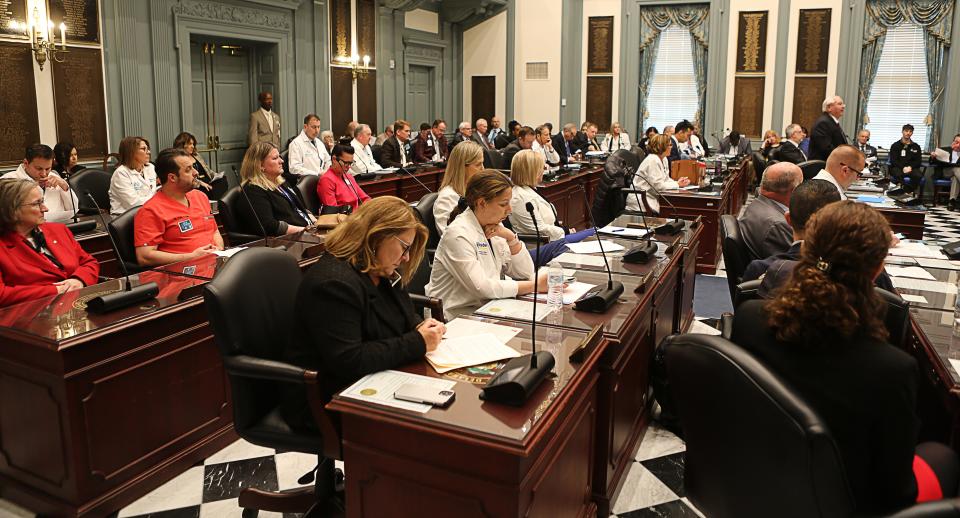How a hospital cost review board in Delaware aims to rein in health care costs
Editor's Note: This story has been updated to add Nemour's Children's Hospital to the list of facilities that would be expected to share budget information with the review board.
A bill that has been the center of controversy and division among Delaware lawmakers and health care providers passed the state House on Tuesday, setting the stage for the implementation of a hospital cost review board.
In the weeks leading up to Tuesday’s vote, stakeholders aggressively opposed the legislation and laid out a world where health care jobs could be cut and services to the most vulnerable populations could be eliminated.
State lawmakers who supported the bill – which passed both the Senate and House mostly along party lines – criticized health care providers for spreading misinformation and targeting low-income and Black and brown Delawareans in their threats for lost service.

Proponents of House Substitute 2 for House Bill 350 say the measure aims to ensure hospitals align pricing within annual spending benchmarks set by the state – an effort that Delaware previously pursued with hospitals on a voluntary basis, but one that medical providers rarely followed.
SENATE VOTE: How Delaware Senate approved a modified hospital cost review board bill and what's next
In 2018, Delaware established the health care spending benchmark – a figure that has hovered between 3% and 4% since its implementation, but health care providers have hit that target only once: in 2020 during the height of the COVID-19 pandemic.
As the dust settles on the controversial bill that now heads to Gov. John Carney’s desk for a signature, what does the legislation actually do?
Why is the state creating a review board?
The goal of the Diamond State Hospital Cost Review Board is to prevent health care costs from growing unsustainably.
Delaware’s per capita health care spending increased 8.9% from 2021 to 2022, according to a recent presentation made on the state’s spending benchmark to the Health Care Commission on May 2, 2024. The increase was the highest in the region and surpassed all other regions in the country, as well as the national rate of 5.1%.
Washington, D.C.'s and Maryland’s increase was 4.1%; New Jersey’s was 6.1%; and Pennsylvania’s was 5.6%, according to the state’s presentation.
Lawmakers acknowledge that health care costs are expansive and aren’t exclusively due to hospitals, and pledged to tackle other areas that are driving health care costs.
What will be the spending limits?
In 2025 and 2026, the spending benchmark will be set at either 2% growth over the previous year or the Core Consumer Price Index plus 1% over rates from the previous year, whichever is higher.
In 2027, the Delaware Health Care Benchmark will come into play. The benchmark is set by a subcommittee of the Delaware Economic and Financial Advisory Council, a panel of state officials and economists who forecast the state’s budget projections.
In previous years, the state’s health care spending benchmark was 3.8% in 2019 and has slowly declined to about 3%.
What budget information must hospitals submit?
The bill impacts seven hospitals in Delaware: ChristianaCare, Bayhealth Kent, Bayhealth Sussex, Beebe, Nanticoke, St. Francis and Nemour's Children's Hospital.
Nemour's is exempt from the temporary pricing measure, but would still have to share budget information with the review board, according to the Delaware Healthcare Association.
HOSPITAL OPPOSITION: Delaware hospitals say cost review board proposal a 'non-starter' for providers
Some of the following that facilities will be expected to submit for the board’s review include:
Budget for the forthcoming year that includes expenditures and revenues.
Spending and revenue data from the previous year.
Financial information like assets, liabilities, fund balances, rates and charges.
Scope of services and volume of service.
New services and programs for the upcoming year.
Projected 3-year capital budget.
A comparison of the hospital’s cost of service to other comparable facilities in the region.
When would the review board influence a budget?
State lawmakers have stressed that the review board wouldn’t immediately influence a hospital’s budget.
It’s when the hospital does not meet the benchmark that further scrutiny will be pursued – and a hospital has to fail to meet the benchmark three consecutive times (three years in a row) before the board begins wading into a hospital's budget.

What happens if a hospital exceeds the benchmark?
Hospitals would first be required to submit a performance improvement plan “that details specific strategies, adjustments and next steps proposed by the hospital to rein in costs, along with a timetable for implementation, allowing hospitals to adjust their own costs without additional state intervention,” according to state lawmakers.
If the improvement plan doesn’t control prices, then the review board could extend the timeline for the improvement plan or require the hospital to modify its budget.
LEGISLATIVE COMPROMISE: After major pushback, Delaware's hospital cost review board bill to see vote. What changed?
These decisions can be appealed to the state Superior Court.
Hospitals could also face a civil penalty of up to $500,000 should an entity knowingly fail to provide information or adhere to the “standards, procedures, and deadlines related to the budget review process.”
Who is on the review board?
The Diamond State Hospital Cost Review Board will be made up of six members appointed by the governor and confirmed by the state Senate, as well as the executive director of the Delaware Healthcare Association, who would be a non-voting member.
Members appointed by the governor will serve a four-year term, except initial members may be appointed for less than four years to create staggered terms. The governor will also appoint one member as chair of the board.
Do members have to have healthcare experience?
Board members must have the following qualifications:
Knowledge of health care policy and delivery, or business, finance or accounting.
Knowledge, experience and characteristics that “complement” the remaining board members.
Remain impartial and “free from undue influence” by personal, business or professional relationships with anyone who may be subject to supervision or regulation by the board.
Will board members be paid?
Appointed members would be paid annually.
According to the bill’s fiscal impact note, the chair would be paid $40,000 and board members would be paid $35,000.
Read the revised legislation
The revised version of Delaware House Bill 350 by Mandy on Scribd
Got a tip? Contact Amanda Fries at afries@delawareonline.com, or by calling or texting 302-598-5507. Follow her on X at @mandy_fries.
This article originally appeared on Delaware News Journal: Delaware health care costs targeted with hospital review board

